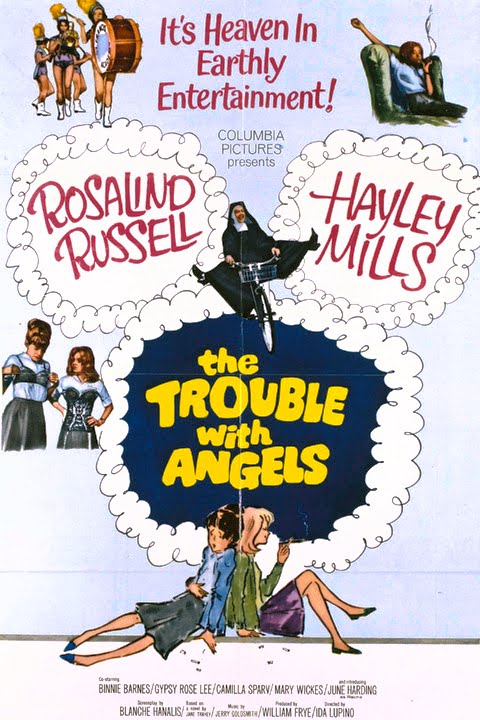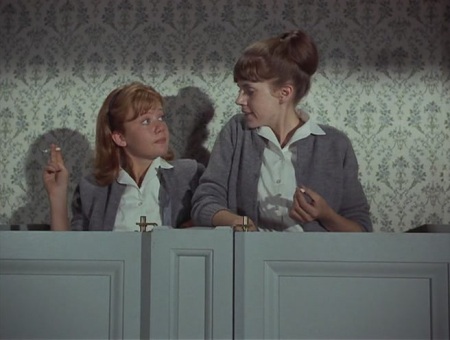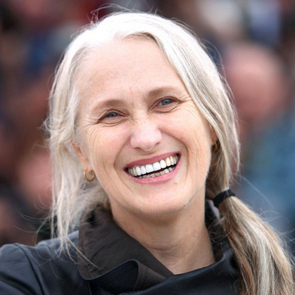
“The sex of a director doesn’t mean a hoot. The one all-important thing is talent. Somehow it has evolved that directing is a man’s profession. A woman has a tough, almost impossible time breaking down this case barrier. Miss Arzner managed it. Ida is doing it now.”
When Rosalind Russell said this to reporters on the set of The Trouble With Angels, neither she nor Ida Lupino could have predicted that this would actually be Ida’s last film. So how exactly did a writer/director who’d made her name on small budget social message pictures end up directing a Hayley Mills comedy co-starring Rosalind Russell as a mother superior? And who could have predicted that a noir director could do comedy?
When Ida Lupino’s production company The Filmmakers shuttered its windows in the mid-1950s, Lupino moved to the burgeoning world of television to continue directing. Then (as now), TV was a much more open to female creators, and so Lupino flourished. She directed in a variety of genres, from comedy (Gilligan’s Island) to thriller (Alfred Hitchcock Presents) to Westerns (Have Gun - Will Travel). In many ways, Lupino was already the ideal television director. TV shows were shot quickly, on a budget, and often on location - just like Lupino’s early pictures. What Lupino got from TV - besides creative control and consistent work - was a chance to expand and diversify her previously narrow (but successful) body of work. And all that new experience helped when her friend William Frye handed her the script to a Catholic schoolgirl comedy in early 1965.

Hijinks and nunsense after the jump.
The Trouble With Angels (based on the book Life With Mother Superior by ad woman Jane Trahey) is a fluffy movie about adolescent rebellion at parochial school. Joining post-Disney Hayley Mills and post-Auntie Mame Rosalind Russell are Gypsy Rose Lee, June Harding, and a gaggle of nuns played by character actresses who are now well known for playing nuns - Mary Wickes (Sister Act 1&2), Marge Redmond (The Flying Nun), and Portia Nelson (The Sound of Music). (I guess you could say they got into the habit. Sorry.) The film follows a fairly simple structure - the girls pull a prank, the Mother Superior pretends to punish them, the girls plot a bigger prank in detention. Far from repetitive, the entire thing comes off as (to borrow a line from Mary) a scathingly brilliant idea.
Lupino knows exactly how to use her stars to the film’s advantage. Though this was the first film Hayley Mills made after her contract with Disney expired, it follows fairly close to her Disney image - precocious teen with a rebellious streak as big as her heart - with “grown up” additions in the form of an occasional brassiere or cigarette. Mills’s child acting had on occasion bordered on cloying, but under Lupino’s direction she loses the “aw shucks” aspect without losing warmth. It’s a tricky thing to make a believable teenager, especially in the middle of a slapstick comedy, but Mills and Lupino manage it.

Rosalind Russell needed no such image assistance from Lupino, but Russell is given an opportunity she hadn’t had in a while - to play small. Russell’s last big comedy hits had been the deliciously over-the-top Gypsy and Auntie Mame. However, in The Trouble With Angels, Russell proves she was just as effective with a well-timed eye roll as with a big number. This movie is truly a master class in the reaction shot, because Russell can go from affectionate to exasperated to stern to smiling in a handful of beats. Though the film is from the perspective of the girls, the Mother Superior is the film’s center.

Lupino’s only foray into big budget film was a smashing success. It even spawned a sequel two years later, though by that time Ida had returned to television. She would continue to direct for another six years, and act for a decade after that, before retiring in the late 1970s. Ida Lupino proved conventional wisdom wrong: It was possible for a woman to direct. It was possible to make the public care about social message pictures. It was possible to run a successful independent production company at the peak of the Studio System. Defying convention was Ida Lupino’s legacy.

Next month on Women's Pictures:
 You voted, we listened, so April is hereby declared Jane Campion Month! Join us for five films by our favorite Kiwi, including a very special Hit Me With Your Best Shot crossover!
You voted, we listened, so April is hereby declared Jane Campion Month! Join us for five films by our favorite Kiwi, including a very special Hit Me With Your Best Shot crossover!
4/2 - Sweetie (1989) - Jane Campion's first feature film explores superstitious sisters, family drama, and the power of tea leaves. (Amazon Instant Video) (Hulu+)
4/9 - An Angel At My Table (1990) - Campion tackles New Zealand history in this drama based on the autobiography of author Janet Frame. (Amazon Instant Video) (Hulu+)
4/16 - The Piano (1993) - Jane Campion became the second woman in history to win an Academy Award nomination for this multi-Oscar winning drama about a mute woman in nineteenth century New Zealand. (Amazon Instant Video)
4/23 - Holy Smoke (1999) - Campion turns her camera towards India, where Kate Winslet may have joined a cult. (Netflix) (Amazon Instant Video)
4/30 - Bright Star (2009) - Join us for the Hit Me With Your Best Shot crossover with Campion's latest feature about poet John Keates. This is going to be a tough one to choose just one shot for. (Amazon Instant Video)